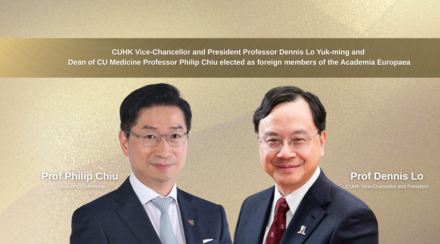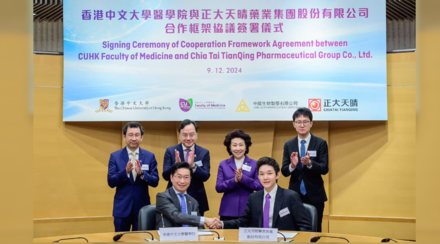CUHK Research Pioneer in Non-invasive Prenatal Diagnosis Elected to US National Academy of Sciences

Profesor Dennis Lo Yuk Ming, Director of the Li Ka Shing Institute of Health Sciences
Prof. Lo Yuk Ming, Dennis, Director of the Li Ka Shing Institute of Health Sciences at The Chinese University of Hong Kong (CUHK) has just been elected as Foreign Associate of the National Academy of Sciences (NAS) of the United States of America. Founded in 1863, the NAS is one of the world's premier learned societies. Members are elected to the NAS in recognition of their distinguished and continuing achievements in original research. Election to the NAS is a widely accepted indicator of scientific excellence and is considered one of the highest honours that a scientist can receive. In the current election, 84 new members and 21 foreign associates from 14 countries were elected. Other professors of CUHK who are members of the NAS include Professor Sir James Mirrlees, Professor Chen Ning Yang, Professor Shing-Tung Yau and Professor Andrew Yao.
Professor Lo has been elected based on his discovery of circulating fetal nucleic acids in the plasma of pregnant women and his pioneering work in translating this discovery into innovative non-invasive prenatal diagnostic tests (e.g. for Down syndrome). In a relatively short period of 1.5 years since the clinical launch of such tests, over 250,000 tests have been performed globally, representing one of the most rapidly developing areas of molecular testing.
Prof. Joseph J.Y. Sung, Vice-Chancellor of CUHK, says, 'We are extremely proud of Professor Lo's contribution to the global scientific community. His discovery and revolutionary research in non-invasive prenatal testing has a far-reaching impact, potentially benefitting millions of pregnant women and their babies worldwide, and epitomizes the cutting-edge research and technology at the Chinese University.'
Professor Lo says, 'I am elated to receive this honour, which is one of the most treasured that a scientist can receive. I wish to thank Prof. Maria New of the Mount Sinai School of Medicine in New York and Prof. Kan Yuet Wai, Honorary Professor of CUHK for nominating me to the NAS. Their pioneering work in genetics research has provided much inspiration for my own work. I would like to thank my research team, collaborators and my family for their untiring support over the years. I am also indebted to the years of support from government agencies, especially the University Grants Committee Areas of Excellence Scheme, the Hong Kong Research Grants Council, and the Innovation and Technology Fund, donors, especially the Li Ka Shing Foundation, and the CUHK.'































